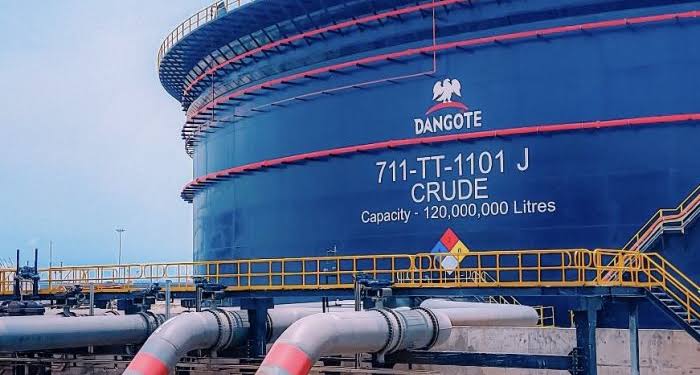Africa’s richest man and Chairman of the Dangote Group, announced that the Dangote Petroleum Refinery is fully capable of meeting the petroleum demands of Nigeria and the entire Economic Community of West African States (ECOWAS) region. This ambitious claim, made during a high-profile visit by ECOWAS Commission President Dr. Omar Alieu Touray on May 29, 2025, underscores the refinery’s potential to drive economic self-reliance and energy security across the continent. Located in the Lekki Free Zone in Lagos, Nigeria, the $20 billion facility is not just a game-changer for Nigeria but a beacon of industrial hope for Africa, as described by Dr. Touray during his tour of the sprawling complex.
A Refinery Built for a Continent
The Dangote Petroleum Refinery, with its staggering capacity of 650,000 barrels per day, stands as the largest single-train refinery in the world. Designed to process a variety of crude oils, including Nigerian grades and other global blends, the facility produces high-quality Euro V standard fuels, which meet stringent environmental regulations. Unlike many imported petroleum products flooding African markets, the refinery’s output aligns with ECOWAS’s 50 parts per million (ppm) sulphur limit, a standard aimed at reducing harmful emissions and improving public health. Imported fuels, often containing sulphur levels as high as 3,000 ppm, have long posed significant health and environmental risks across the region, contributing to air pollution and related illnesses.
Dangote’s vision for the refinery extends far beyond Nigeria’s borders. During the ECOWAS delegation’s visit, he emphasized that the facility’s production capacity is sufficient to supply refined petroleum products—such as diesel, petrol, kerosene, and aviation fuel—not only to Nigeria’s 200 million-plus population but also to the 400 million people across the 15 ECOWAS member states. This includes countries like Ghana, Senegal, Côte d’Ivoire, and Mali, many of which rely heavily on costly fuel imports. By producing high-quality fuels locally, the refinery could eliminate Africa’s dependence on foreign petroleum products, a dependency that has drained billions of dollars from the continent’s economies and stifled industrial growth.
Economic Impact: Slashing Fuel Prices and Boosting Sovereignty
One of the most immediate and tangible impacts of the Dangote Refinery has been its effect on fuel prices in Nigeria. Since commencing operations, the refinery has driven down the cost of diesel from a staggering N1,700 per litre to N1,100 per litre, providing significant relief to businesses and consumers alike. Petrol prices have also seen a dramatic reduction, with Dangote’s product retailing at N815–N820 per litre, compared to the regional average of $1 per litre (approximately N1,600 at current exchange rates). These price cuts are a direct result of the refinery’s ability to produce fuels domestically, bypassing the inefficiencies and profiteering often associated with imported petroleum.
Dangote highlighted the broader economic implications of this shift during the ECOWAS visit. “For the first time, Africa can say we are not just producing for ourselves but controlling our energy destiny,” he stated. By reducing reliance on imported fuels, the refinery is poised to save West African nations billions in foreign exchange, which is often spent on volatile global oil markets. This newfound economic sovereignty could enable governments to redirect funds toward critical sectors like healthcare, education, and infrastructure, fostering sustainable development across the region.
Moreover, the refinery’s operations are creating a ripple effect in Nigeria’s economy. The facility has already generated thousands of direct and indirect jobs, from skilled engineers to local suppliers, and its integration with other Dangote Group projects—such as a fertilizer plant and a planned petrochemical complex—promises to further boost industrial output. The Lekki Free Zone, where the refinery is located, is fast becoming a hub for economic activity, attracting investment and positioning Nigeria as a leader in Africa’s industrial revolution.
ECOWAS Support and Regional Ambitions
The visit by Dr. Omar Alieu Touray and the ECOWAS delegation was more than a ceremonial tour; it signaled a commitment to regional collaboration. Dr. Touray described the refinery as “a symbol of hope for Africa’s industrial self-reliance,” praising its potential to address the continent’s chronic energy challenges. He pledged ECOWAS’s support in opening up markets for the refinery’s products, not only within West Africa but potentially across the entire African continent under the African Continental Free Trade Area (AfCFTA) framework.
This support is critical, as the refinery’s success depends on overcoming logistical and regulatory barriers to cross-border trade. ECOWAS’s 15 member states have diverse energy needs and varying levels of infrastructure, but the organization’s commitment to harmonizing fuel standards and facilitating market access could pave the way for the refinery to become a pan-African supplier. Dr. Touray also highlighted the environmental benefits of the refinery’s Euro V fuels, noting that their low sulphur content aligns with ECOWAS’s push for cleaner energy and could set a precedent for other African nations to follow.
Challenges and Opportunities Ahead
While the Dangote Refinery’s potential is undeniable, its journey to becoming West Africa’s energy powerhouse is not without challenges. Nigeria’s domestic oil sector has historically been plagued by inefficiencies, including pipeline vandalism, crude oil theft, and regulatory bottlenecks. Ensuring a steady supply of crude oil to the refinery remains a hurdle, despite Dangote’s partnerships with the Nigerian National Petroleum Corporation (NNPC) and other suppliers. Additionally, competition from established global oil markets and resistance from importers who profit from the status quo could pose obstacles to the refinery’s regional ambitions.
However, the opportunities far outweigh the challenges. The refinery’s ability to produce high-quality fuels at competitive prices positions it as a catalyst for industrialization across West Africa. By supplying affordable energy, it could power manufacturing, transportation, and agriculture, driving economic growth in a region that has long been held back by energy poverty. Furthermore, the refinery’s focus on environmental sustainability aligns with global trends toward cleaner fuels, potentially attracting international partnerships and investment.
Join our Whatsapp channel to stay updated always!



xob8aa
lsat2g
c4rlp4
6eua58
dxnlyc
23eoma
9iv34o
0s9wcf
ayjtby